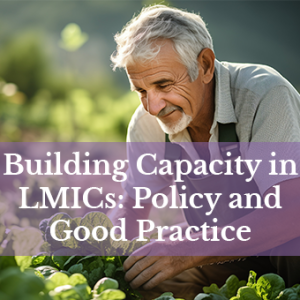
Time to Build Care Capacity for Aging Care in Africa : Current State of Formal Geriatric/Gerontological Training and Perspectives of Informal Caregivers from South Africa, Botswana and Zambia
Presenter(s):
Michael Kalu; Magen Mhaka-Mutepfa; Osborn Kabingu Mutapa; Nicola Plastow, York University/Emerging Researchers & Professionals in Ageing – African Network, Canada
Abstract
Capacity building for aging care and research in Sub-Saharan Africa (SSA) has primarily and sometimes inadvertently concentrated on research, with emerging evidence highlighting the importance of both formal and informal caregiving. As the aging population in SSA is projected to increase significantly in the coming years, it is increasingly vital to expand focus beyond research capacity alone to include the development of caregiving capacity. This encompasses providing geriatric and gerontological training for health and social care professionals, as well as strengthening the skills and support systems of informal caregivers, including families, friends, and community networks. Such a holistic approach is essential to ensure sustainable and culturally appropriate aging care in the region.
This symposium presents a comprehensive examination of geriatric and gerontological professional training, caregiving experiences, social support systems, and participation factors among older adults in Sub-Saharan Africa (SSA).
The first study offers a rapid review of the current state of geriatric training across disciplines such as medicine, nursing, physiotherapy, occupational therapy, social work, and psychology, revealing progress yet highlighting significant gaps, particularly in informal caregiving and policy integration. It emphasizes the need for a standardized, culturally relevant competency framework to ensure consistent and interdisciplinary training tailored to SSA’s diverse contexts.
Complementing this, qualitative research in Botswana explores the lived experiences of older caregivers, emphasizing their cultural duty-driven roles, coping mechanisms, and health impacts, underscoring the necessity for culturally responsive policies and support systems. Similarly, research from Zambia highlights the role of traditional community support systems in alleviating loneliness among older residents of care homes, advocating for the formal integration of these systems into national aging frameworks and care practices.
Further, quantitative studies from South Africa investigate factors influencing participation among frail and community-dwelling older adults, identifying cognitive functioning and independence in self-care as key determinants of engagement in meaningful activities. These findings reinforce the importance of tailored interventions aimed at maintaining cognitive and functional abilities to promote healthy aging.
Collectively, these studies underscore the critical need for contextually adapted, interdisciplinary approaches to geriatric care, policy development, and community engagement in SSA, with implications for enhancing quality of life and fostering age-friendly environments across the region.
Bio(s):
Presenter 1
Michael Kalu is an Assistant Professor of Rehabilitation Therapy in Clinical Treatment & Clinical Care at York University’s School of Kinesiology and Health Science. Moreover, his interdisciplinary expertise stems from a diverse academic and professional background, including training as a physiotherapist (Bachelor of Medical Rehabilitation – Physiotherapy, University of Nigeria), social gerontologist (MSc in Gerontology, University of Southampton), and rehabilitation scientist (MSc in Rehabilitation Science, Queen’s University & PhD in Rehabilitation Science, McMaster University). In addition, he expanded his research expertise as a postdoctoral fellow at Dalhousie University. Dr. Kalu serves as the Scientific Director of the Emerging Researchers & Professionals in Ageing – African Network, contributing to impactful aging research in Sub-Saharan Africa. His work is particularly focused on improving the health and mobility of older adults through innovative, culturally adapted approaches.
Speaker 2 –
Magen Mutepfa is the co-founder of Ageless Inspirations, liaison Officer for PION, Chair for CommonAge Africa-Botswana, and an AProfessor. Through her research, advocacy, and mentorship, she remains committed to shaping policies and interventions that enhance the well-being of the aging population. Previously, she was a teaching assistant in the University of Sydney (NSW) and a recipient of the Australian International Postgraduate Research Scholarship and APA awards. Her primary research interests include Aging, health/well-being, HIV/AIDS, abuse/rights, with a current focus on Dementias (AD/ADRD) in older adults with HIV. She received three prestigious research awards on Spousal abuse (2001), Resilience and wellbeing in older adults(2014_Manchester), and National Research Excellence Award (2023_ Botswana)
Speaker 3
Osborn Kabingu Mutapa is a Commonwealth scholar and a holder of a double masters in Development studies obtained from the University of Lusaka and MSc in Global Ageing and Policy obtained from the University of Southampton. I completed my undergraduate studies in Development Studies at the Zambian Open University and prospecting for Ph.D. candidature in the fall of 2025.
Currently am managing my own initiative, “Confluence Resources” which is managed as a social business capacitating community based organisations that are offering services to older people. We are implementing a community led care (indigenous) options responding to the changing livelihoods dynamics for older people in the rural Kazungula district some 180 km from the central business district of the city of Livingstone dubbed the ”Green Options Project”. The focus is on adapting the Traditional Community Support Systems in providing a continuum of care for older adults as a community collective.
Research Areas of Interest
Qualitative and Ethnographic Research methods, Social Gerontology (Social Justice for older adults in resource constrained settings), Comparative Social Policy, and Community building and Indigenous Knowledge systems in Zambia.
Presenter 4
Nicola Plastow is an Associate Professor in the Division of Occupational Therapy at Stellenbosch University in South Africa. Her research, teaching, and clinical practice focus on enabling participation in everyday activities for people with disabilities and older people. These everyday activities include self-care (e.g. Washing and dressing), community mobility (e.g. Driving and use of public transportation), food activities (e.g. Shopping, cooking and eating), and social participation. With a strong focus on health equity for people marginalised by ageism, race, and poverty, Nicola Plastow works to improve fair access to rehabilitation and health promotion services through her mixed-methods research and occupational therapy practice. She manages an occupational therapy service for older people in Bishop Lavis, Cape Town, that promotes social participation and occupational justice through community-engaged learning for undergraduate health professions students.
